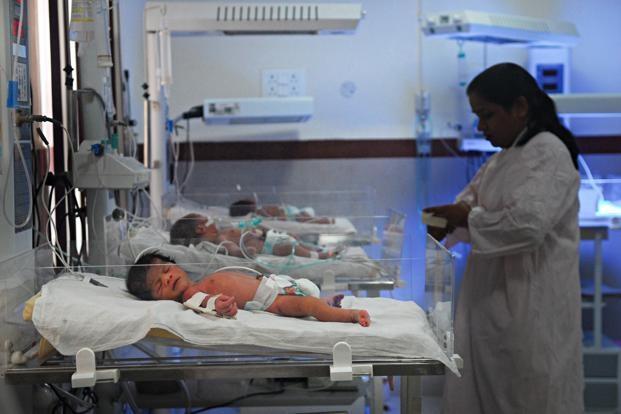Study Says There Are 9 Lakh ‘Preventable’ C-sections in Private Hospitals in a Year

According to a study conducted by Indian Institute of Management (IIM), Ahmedabad, there were potentially 9 lakh ‘preventable’ unplanned caesarean section deliveries out of the 70 lakh deliveries that happened in private hospitals in the year 2016, driven mainly by financial incentives. The study, titled “Too much care? Private health care sector and surgical interventions during childbirth in India,” was carried out by IIM-A faculty member Ambrish Dongre and doctoral student Mitul Surana. It is based on the latest, that is, the fourth round of the National Family Health Survey (NFHS), carried out in 2015-16.
As per the fourth round of NFHS, 40.9 per cent of the births in private facilities happened through C-sections, as compared to the 11.9 per cent in public facilities. The IIM-A study says that people choose private hospitals above public sector because of high absenteeism, inadequate infrastructure, unavailability of medicines, over-crowding, long waiting times, and lack of respectful behaviour combined with little effort on part of the doctors in public sector. It says that these issues have made private healthcare providers a preferred option to the people, despite higher fees for their services.
The study also says, “Private providers are more likely to provide over-intensive treatments either as a response to demand from patients or due to financial incentives.” According to the NFHS, the study quotes, “A natural birth in private facility costs on an average Rs 10,814, while a C-section costs Rs 23,978, more than twice the cost of a natural birth.” It also states that even though C-section is an important surgical intervention during childbirth under certain situations, and when medically justified, prevents maternal and perinatal mortality and morbidity, performing it when ‘not needed’ can impose a huge burden on the mother and the child, apart from the large out-of-pocket expenses. “For the new-born, it means delayed breastfeeding, lower birth-weight, respiratory morbidities, increased rate of hospitalisation, lower Apgar scores and its implication in the long run. For the mother, it can mean pain, higher chances of infection, breastfeeding challenges, complications related to future pregnancies, reduction in fertility and psychosocial consequences.”
Also Read: Modi Government Set To Remove Compensation Clause From New Clinical Trial Rules
The study found out that “a woman opting for private facility is 13.5-14 percentage points more likely to undergo an unplanned C-section,” as compared to public facilities. The study states, “Even though this is a very conservative estimate, because some of the planned C-sections could be a result of supplier-induced demand, this effect is quite large. With around 7 million births (of the 26 million births in India in 2016) in private facilities, even a conservative estimate of 13.5 percentage points for the effect of private sector implies that there were potentially 0.9 million preventable C-sections in the private sector. We also perform additional tests to rule out alternative explanations such as the private sector might be catering to riskier pregnancies or the public facilities might be ill-equipped to carry out C-sections.”
Overall, the study said, the results indicate that the probability of C-section in private medical facilities remains significantly higher than in public sector, even after controlling for various background characteristics, risk factors, and demand factors.
The study was aimed at evaluating the role of the private sector in performing C-sections during childbirth in India. It states that private healthcare providers are set to play a big role in India with the National Health Policy, 2017 envisioning a tax-financed healthcare system with ‘strategic purchasing’ from the private sector, and announcement of Pradhan Mantri Jan Aarogya Yojana, which provides a cover of Rs. 5 lakh for poor households to seek secondary or tertiary care in any government or empaneled private hospital. “The scheme aims to cover 40% of India’s population or roughly 50 crore, and is touted as world’s largest health program. Therefore, it is important to evaluate whether the private sector can be an effective partner in providing health services,” it says.
Also Read: Implant Files: Global Examination of the Medical Device Industry
The IIM-A study ends with a statement that says, “Our findings, more generally, call for a critical assessment of the role of the private sector in delivering the optimal intensity of care during childbirth. This is particularly important in the context of India (and other developing countries) where public health spending is low (1.3% of GDP in India in 2015-16) and the private sector plays an important and ever-expanding role in health-care provision.”
Get the latest reports & analysis with people's perspective on Protests, movements & deep analytical videos, discussions of the current affairs in your Telegram app. Subscribe to NewsClick's Telegram channel & get Real-Time updates on stories, as they get published on our website.
























